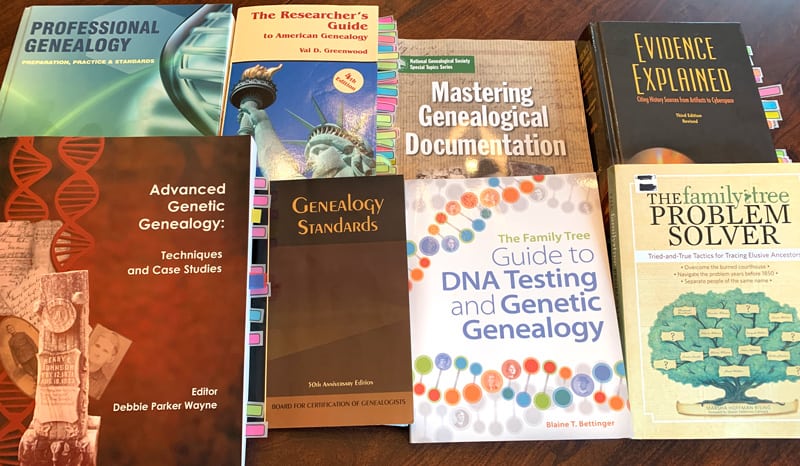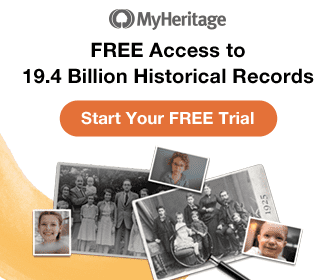Looking for the best genealogy books to help your research? Look no further! I’ve compiled a list of the nine essential genealogy books that are always by my side. These books have helped me work through countless brick walls and I’m confident they can do the same for you.
1. Evidence Explained by Elizabeth Shown Mills
Evidence Explained is a must-have for any genealogist, regardless of experience level. This reference book is filled with information on how to cite sources correctly and analyze evidence. The first few chapters cover the basics of citations and evidence analysis, which is a great introduction for beginners. Plus, the inside front cover features a helpful diagram that illustrates how sources, information, and evidence interact with each other. Whether you’re stuck on how to cite a source or need help analyzing evidence, Evidence Explained has you covered.
2. Mastering Genealogical Proof by Thomas Jones
Mastering Genealogical Proof is a great guide for those who want to learn the basics of genealogy research. He goes into detail about the research process, from setting goals and focusing on specific questions to analyzing information and making conclusions. If you’re only going to read one book on the subject, this should be it! The book is perfect for those who are just starting out on their family history research and explains how to start, what tools one should use, and where to look. He also talks about the different classifications of sources and information so you understand them well.
2.5 Tracing Our Past by Marc McDermott
Tracing Our Past unravels the joy and complexity of discovering your family history, offering a seamless blend of expert advice and engaging storytelling. In recommending my own book, rest assured, my bias is worn as a badge of honor—after all, who better to navigate the intricate dance of genealogy than someone utterly captivated by the stories of our ancestors? This guide promises not just to illuminate the path to your past but to do so with a genuine enthusiasm for every discovery along the way. Here’s to finding the extraordinary tales hidden within your family tree, guided by someone who’s just as eager to uncover them as you are.
3. Mastering Genealogical Documentation by Thomas Jones
Mastering Genealogical Documentation by Thomas Jones is one of the best books on genealogical documentation that I have found. This book is all about why and how to document your sources and information. It’s an essential read for anyone looking to improve their research skills. This is a great read and goes over the rationale and process of why and how to document your sources and information. There are so many skills you will pick up which will help elevate your research abilities.
4. Genealogy Standards by Board for Certification of Genealogists
Genealogy Standards is a must-read if you want to build a career in genealogy or further your education. Published by the Board for the Certification of Genealogists (BCG), it outlines the industry-accepted standards for research, documentation, writing, education, and ethics. As the industry evolves, the BCG is quick to publish new and updated editions of this book – including standards for using DNA evidence in genealogical analysis.
5. The Family Tree Guide to DNA Testing and Genetic Genealogy by Blaine Bettinger
The Family Tree Guide to DNA Testing and Genetic Genealogy is a fantastic resource if you want to take your genetic genealogy research to the next level. In this book, Blaine Bettinger provides a great introduction to the different types of DNA and how they can be used in your research. You’ll learn about the basics of DNA testing, common misconceptions, ethics of testing, ethnicity estimates (and how they work), third-party tools, and more.
6. Advanced Genetic Genealogy by Debbie Parker Wayne
Advanced Genetic Genealogy: Techniques and Case Studies is a highly recommended book for anyone hoping to take their advanced genetic genealogy skills to the next level. This book is packed with information and written by some of the top experts in the field. You’ll learn about segment triangulation, visual phasing, X and Y research techniques, unknown parentage research, endogamy, raw DNA data, and more. So if you’re ready to step up your game, then this is the book for you!
7. Professional Genealogy by Elizabeth Shown Mills
Professional Genealogy is an excellent resource if you want to pursue a career in genealogy or taking your skills to the next level. Elizabeth Shown Mills, the author of Evidence Explained, has put together a collection of chapters by top professionals in the field. The book covers everything from professional preparation and credentials to research skills and writing techniques. Whether you’re a hobbyist or a professional genealogist, there’s something for you in this book.
8. The Researcher’s Guide to American Genealogy by Val Greenwood
The Researcher’s Guide to American Genealogy is a must-have for anyone researching American ancestry. This 800-page book covers almost every type of source imaginable and will help you find the information you need. It’s an important lesson to learn that before doing any research, you should think about and write down all the different sources that could provide evidence for your question. This book goes into detail about nearly every type of source for American research and tells you where to find them and what type of information you can expect.
9. The Family Tree Problem Solver by Marsha Hoffman Rising
The Family Tree Problem Solver provides great ideas and exercises to help you stay focused on the bigger picture while doing research. If you’re like me, you’ve probably hit a few roadblocks while doing research. If that’s the case, then this book is for you. It’s perfect for anyone who’s frustrated by things like burned-down courthouses, missing census records, or finding vital records before civil registration.
10. Locality books!
The last recommendation I have for you could prove to be the most valuable. It’s so important to do locality research. This involves looking into books at the country, state, county, and town levels. By doing this, you can learn a lot more about your ancestors and find new clues to help you break through those brick walls.
Final thoughts
The best genealogy books offer a wealth of information and can be instrumental in helping you find answers to your questions. It’s important that you take the time to research all possible types of sources before doing any type of work, which is why it pays off to have a few good reference guides on hand at all times. In this article, I’ve highlighted nine essential titles for your library. Which one are you going to add next?
See more educational resources.



